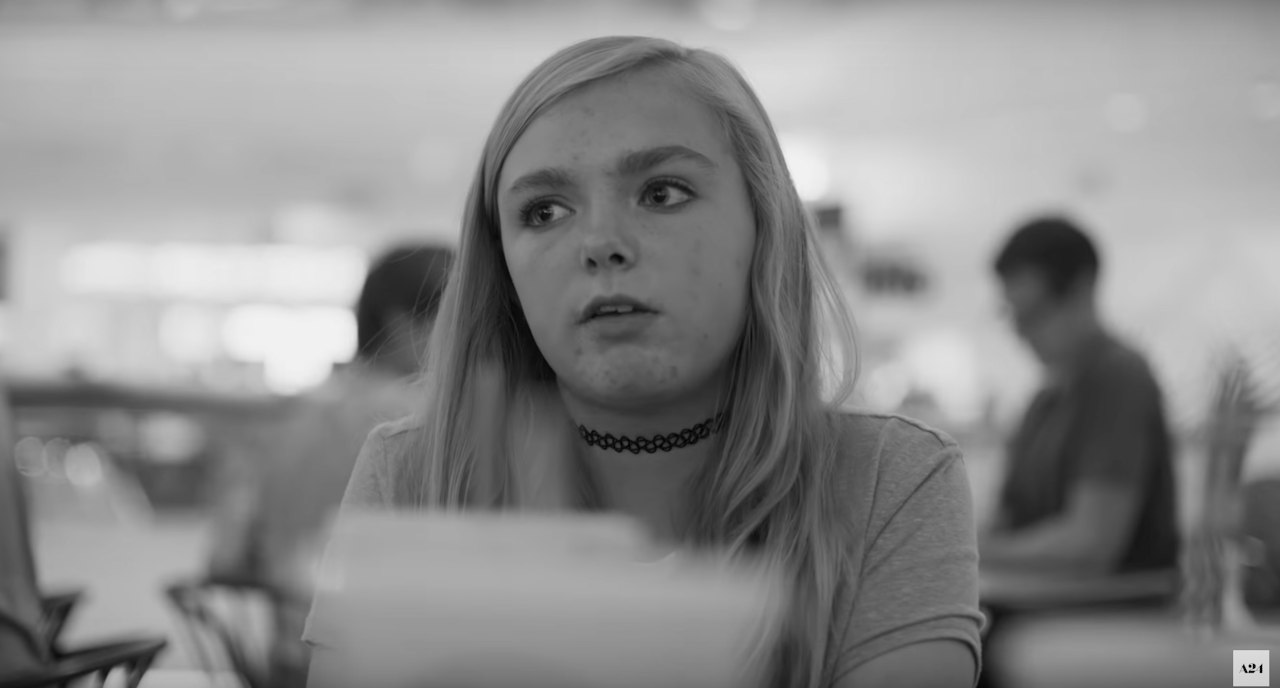For most of recent history, middle schoolers voiced their thoughts by writing in a diary, or by rambling to their friends. Kayla Day, the protagonist of Bo Burnham’s new movie Eighth Grade, has a webcam. We meet her first as she stammers through a monologue on “being yourself,” all while rapidly interjecting with verbal fillers and incredibly awkward pause that might make your skin itch. Anyone who remembers the desperate need to please at that age — aka, anyone who ever attended eighth grade — will desperately want to tell her to please chill, stop talking, and take a deep breath.
Kayla, portrayed by Elsie Fisher, is a soon to be high schooler who desperately wants to be seen. The film takes place during Kayla’s last week of middle school, which is filled with incredible joy, sadness, and unpredictability as she prepares for high school. Kayla tries to act confident for the webcam, but her self-consciousness in reality is palpable. She pores over her pimpled skin, has the literal wind knocked out of her by looking at her crush’s skinny shirtless body, and innocently practices her first kiss on her hand. She’s hardly at her best, but she shouldn’t be at that age.
In a recent profile, Burnham explained that, more than anything else, the film was meant to capture that uneasy feeling of nervousness. “I did not set out to write a movie about eighth grade. I wanted to talk about anxiety — my own anxiety — and I was coming to grips with that,” he told The New Yorker. There is certainly more than enough anxiety to spill over from the screen into the audience. Fisher, a relative newcomer, excels at providing secondhand embarrassment through her nervous motor mouth and frozen stare. And yet, Kayla is not just a collection of awkward moments — she really is lovable, as her dorky but dedicated dad tells her so often. In middle school, it is so easy to never cut yourself any slack, to wish that you were finally and already cool. Kayla is cool, in her own way, not that she can recognize it.
When has growing up ever been less than terrifying? As someone with a soon to be 13-year old sister, I know that middle school is very different from when I was growing up — for one, there are school shooting drills, which Kayla and her peers go through detachedly, lacking any true understanding of the importance of the lesson. But it’s still that weird in-between stage, with too many expectations and feelings and odors crammed into one building; some things are evergreen. At one point, a high schooler asks Kayla when she got Snapchat. When she says it was during fifth grade, he exclaims (much to his friends’ disapproval) that Kayla must be wired differently. This is the kind of thing often said by those much too old to understand the extent of that new wiring, who think the entire system has changed. But the truth is, Kayla is the same as all eighth graders have ever been. She wants so badly to be liked, and is so mystified by the art of being put together.
The difference is that her eighth grade experience is much more forwardly and immediately public. Today’s young girls have access to online makeup tutorials, and don’t have to endure the self-taught woes of middle school eyeliner. Class clowns have to be up to date on every meme and Vine (the boy who yells out LEBROOOOON JAMES! every few scenes is wildly funny). Kayla spends hours every day on Youtube, Instagram, and Snapchat. Her crush, who she doesn’t realize is actually a giant prick, only speaks to her when she falsely claims to have a nude selfie folder on her iPhone.
Up front, Kayla and her peers are expected to play adult roles, just like eighth graders throughout history, but they also must document it and share it digitally. Having to prove your self-worth on social media, which is essentially a second school cafeteria, must be absolutely exhausting. As the internet has evolved to suck up more of its users lives, this kind of engagement is now an everyday reality for current middle schoolers. At one point, Kayla peruses an online tutorial on oral sex from a YouTube “sexpert,” and almost fellates a banana. Her desire to learn a sex act she finds disgusting at way too young an age, in order to impress a boy, is not new. Her means of learning is.
As we might expect, it’s in this last week of school that Kayla learns to put the past behind her. In a very dramatic fashion, she decides to burn her middle school time capsule in her backyard, in an effort to push ahead for the benefit of her next year’s self. It’s a classic coming-of-age move, but the real value of the scene comes from the heart to heart she and her father have sitting by the fire. For the first time in the film, she really hears him. He lets her know that even in all her adolescent silent suffering, she really is seen for who she is. And by the end, she’s someone who can take the next step.
